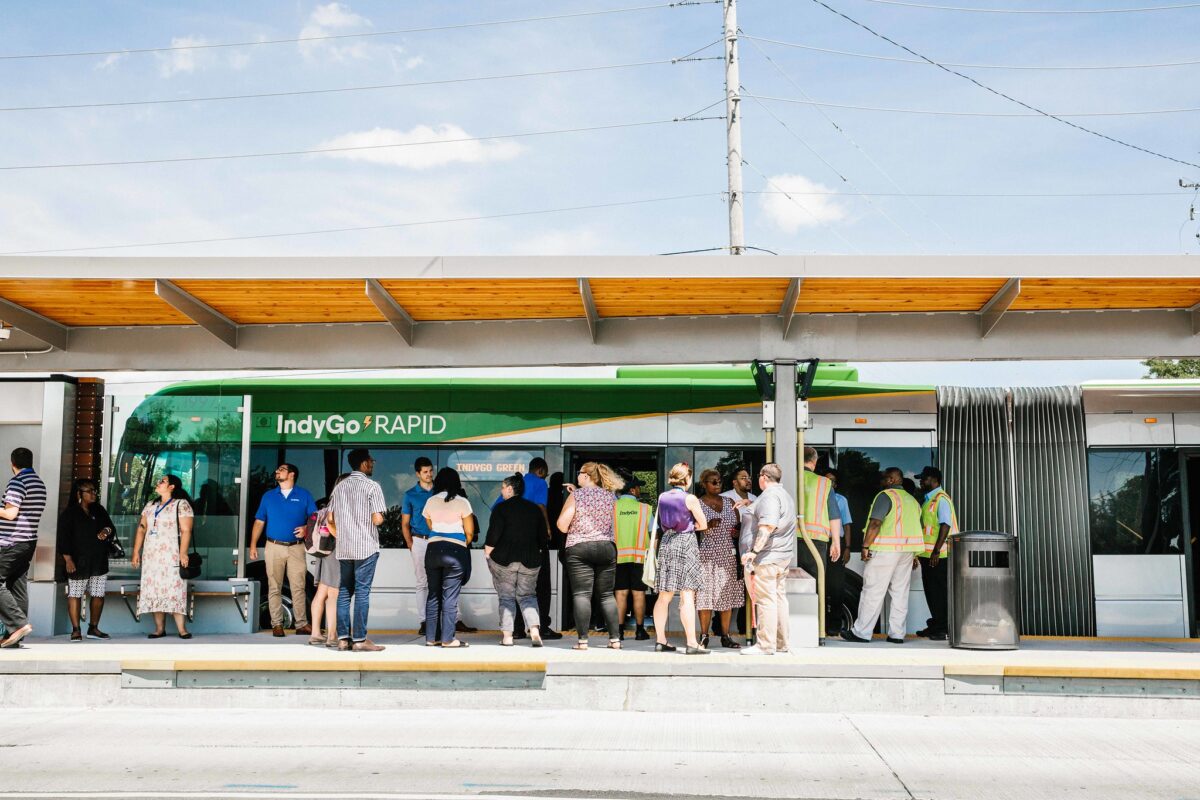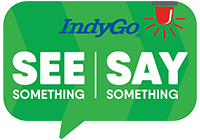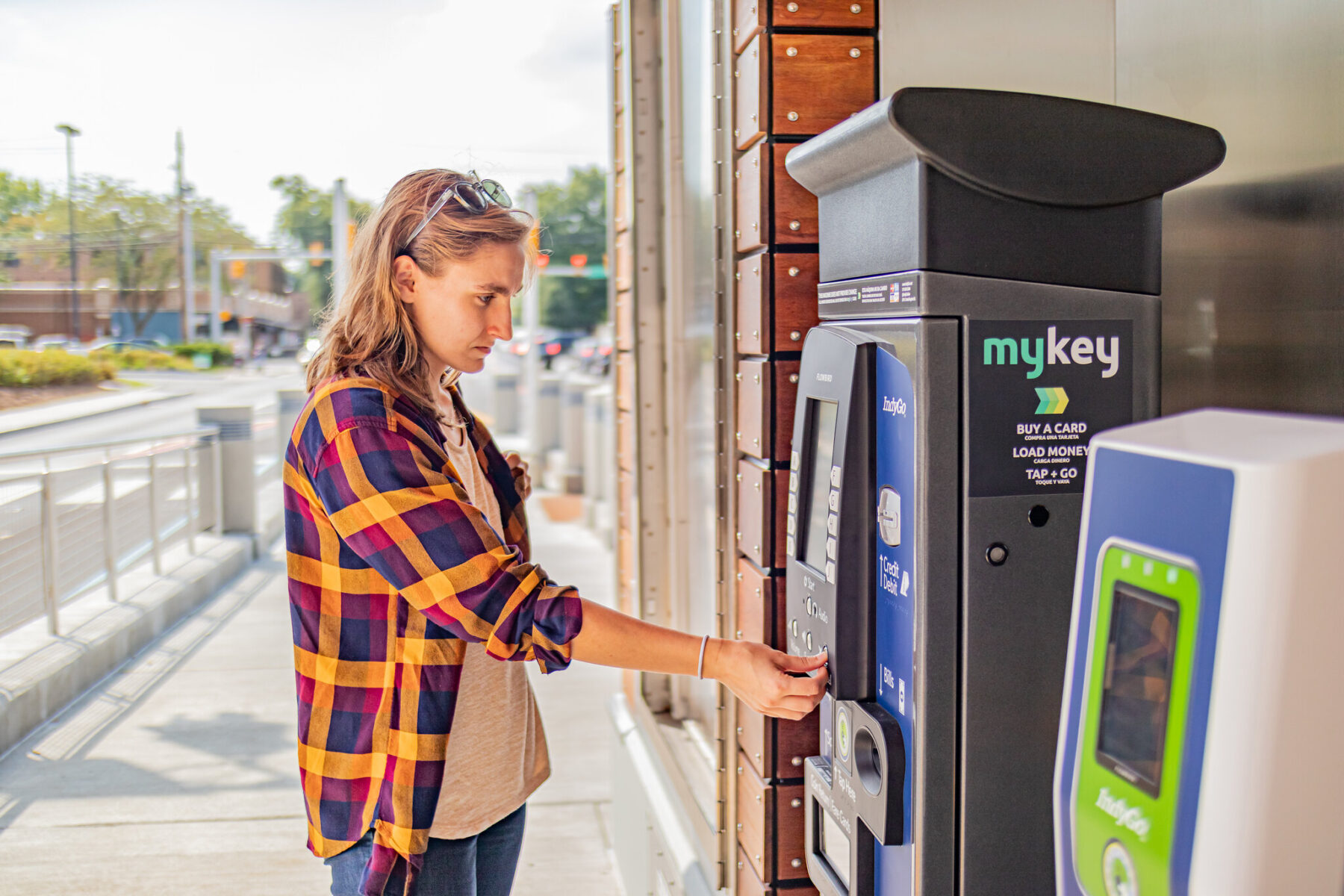
Our Vision
IndyGo will foster a reliable and customer-centered fare payment experience. In so doing, IndyGo is committing to efficient and cost-effective solutions that are convenient and intuitive to our riders.
New Fare Structure
The IndyGo Board of Directors voted to approve a new fare policy Aug. 21, 2025. The new structure is listed below. The fixed-route fare increase will take effect Jan. 1, 2026. The IndyGo Access fare increases will take effect July 1, 2026. IndyGo also will stop selling 10-trip, 31-day, S-Passes and Summer Youth Passes on July 1, 2026. Starting July 1, 2027, we will stop accepting 7-day, 10-trip, 31-day, S-Passes and Summer Youth Passes.
Fare Structure – Fixed Route
(Effective Jan. 1, 2026)
| Fare Type | Full Fare | Half Fare |
|---|---|---|
| 2-Hour Unlimited | $2.75 | $1.35 |
| Daily Fare Capping | $6.00 | $3.00 |
| Weekly Fare Capping | $24.75 | $12.15 |
| 10-Trip* | $27.50 | $13.50 |
| 31-Day* | $95.00 | $47.50 |
| IndyGo Access One Trip | $3.50-$10.00** | $1.35*** |
| Veterans Pass | $2.00 for initial, $5.00 for replacement | N/A |
Fare Structure – IndyGo Access
(Effective July 1, 2026)
| Service Area | Fare |
|---|---|
| ADA Area | $5.50 |
| Premium Area | $11.00 |
| Same Day | $15.00 |
*10-Trip and 31-Day Mag-stripe Passes available from Jan. 1 to June 30, 2026.
**Price varies based upon trip origin and destination. Fares for IndyGo Access riders will change July 1, 2026.
***MyKey Half Fare Cards offer $1.35 rides to eligible IndyGo Access individuals on fixed route service.
Opportunities to Learn More
IndyGo wants to ensure all riders are familiar with the upcoming changes to fares. Please see the list of public meetings below and the Community Toolkit to learn more about the new fare policy.
Upcoming Public Meetings & CTC Open Houses
| Date | Time | Location |
|---|---|---|
| Tuesday, Sept. 9, 2025 | 10 a.m. | Virtual Public Meeting |
| Thursday, Sept. 11 | 5-7 p.m. | Julia M. Carson Transit Center Open House 201 E. Washington St. |
| Saturday, Sept. 13 | 10 a.m. – noon | Transit Center Open House |
| Tuesday, Sept. 16 | Noon | Virtual Public Meeting |
| Tuesday, Sept. 23 | 6 p.m. | Virtual Public Meeting |
| Tuesday, Sept. 30 | 6 p.m. | Virtual Public Meeting |
| Thursday, Oct. 9 | 5-7 p.m. | Transit Center Open House |
| Saturday, Oct. 11 | 10 a.m. – noon | Transit Center Open House |
| Saturday, Nov. 8 | 10 a.m. – noon | Transit Center Open House |
| Thursday, Nov. 13 | 5-7 p.m. | Transit Center Open House |
| Thursday, Dec. 11 | 7-9 a.m. | Transit Center Open House |
| Saturday, Dec. 13 | 10 a.m. – noon | Transit Center Open House |
| Thursday, Jan. 8, 2026 | 7-9 a.m. | Transit Center Open House |
| Saturday, Jan. 10 | 10 a.m. – noon | Transit Center Open House |
| Thursday, Feb. 12 | 7-9 a.m. & 4-6 p.m. | Transit Center Open House |
| Saturday, Feb. 14 | 10 a.m. – noon | Transit Center Open House |
| Wednesday, Mar. 25 | 11 a.m. | Virtual Public Meeting |
| Tuesday, May 12 | 5:30 p.m. | Virtual Public Meeting |
Frequently Asked Questions
FARE CHANGES
IndyGo hasn’t raised fares in 16 years. Since then, inflation has eroded thevalue of the $1.75 fare. The proposed rate of $2.75 is based on the need to adjust for inflation and the fact that costs to provide the service have continued to climb.
There is never a good time to increase fares. IndyGo is raising fares now because operating costs have risen significantly due to fuel prices, vehicle maintenance and labor. Despite these rising expenses, IndyGo has not raised fares in more than 15 years. Without a fare increase, IndyGo could face difficult decisions like reducing service or deferring upgrades. Another reason for increasing fares now is so IndyGo can see more modest rate increases in the future and ensure we can maintain reliable service and continue investing in and maintaining a strong transit network.
While this fare increase isn’t tied to new routes or expanded services, it plays a vital role in sustaining the transit system our community depends on every day. This adjustment ensures we can protect what matters most to riders: dependable service, safe trips and a system that works for everyone. The additional revenue will help IndyGo:
- Keep buses running reliably by covering rising costs for fuel, maintenance and parts.
- Support the frontline workforce – our operators, mechanics and service staff – who deliver safe, daily service.
- Stabilize IndyGo’s finances to avoid more disruptive changes in the future.
- Maintain fare programs like fare capping, free and discounted passes and half-fare options.
Impact on Riders
As part of the 2019 Fare Policy update, IndyGo began phasing out the 10-trip and 31-day and S-pass to support the transition to the MyKey electronic fare system and simplify the overall fare structure. MyKey offers a more convenient option by allowing riders to pay as they go and automatically earn daily and weekly passes through fare capping—eliminating the need for large upfront payments. This change supports IndyGo’s long-term goals of modernizing the system, improving efficiency and ensuring all riders have access to flexible and affordable fare options.
July 1, 2026.
July 1, 2027.
IndyGo Access is a highly personalized on-demand service delivering people from curb to curb. This is the most expensive service IndyGo provides. The rate is based primarily on the need to adjust for inflation and the fact that the costs to provide the service have continued to climb. By law, we can charge up to twice the fixed-route base fare for the ADA area.
Accessibility
Persons with a disability, persons age 65 and older, and persons 18 or younger will continue to only pay half fare. People who are IndyGo Access clients also qualify for half-fare trips on our fixed route service. Additionally, veterans will continue to ride fare free on our fixed route service.
The MyKey system offers fare capping, allowing riders to “earn” free rides, and daily or weekly passes as they ride and eliminating the need to prepay large sums upfront. This is seen as more equitable, especially for lower-income riders who may not be able to afford a multi-day pass all at once. Additionally, half fares remain in place for seniors, people with disabilities and youth. IndyGo also offers free fare to several groups, including veterans.
What’s Next?
A. IndyGo will launch a communications and marketing effort to explain the fare increases, the differences between MyKey and traditional paper fare, and how the fare-capping system can save riders money. This campaign will include announcements and digital signage on buses and at the Julia M. Carson Transit Center (CTC), advertising, social media and local media coverage, among other things. Educational materials will be translated into multiple languages and formatted for people with limited English proficiency and riders with disabilities (e.g., large print, audio).
B. IndyGo staff will also be available for virtual meetings and in person outreach at the CTC with these events offering translation services, upon request.

